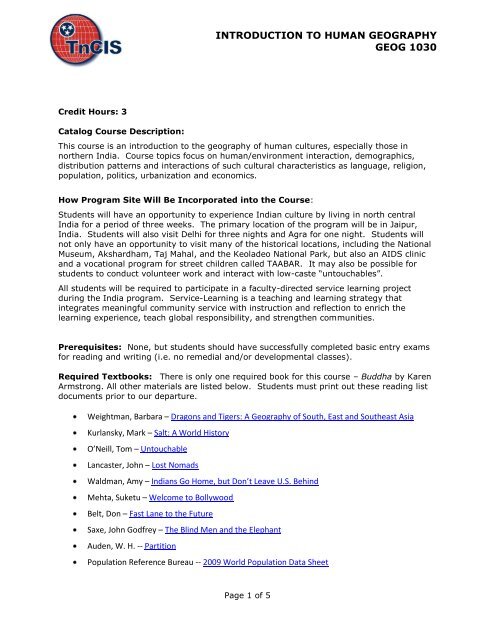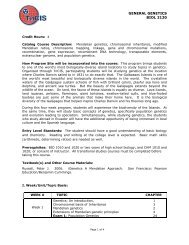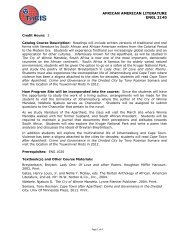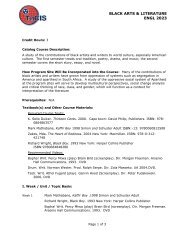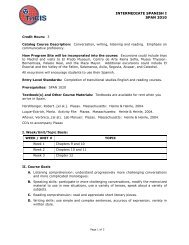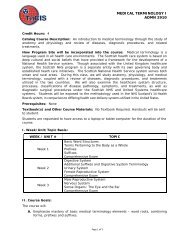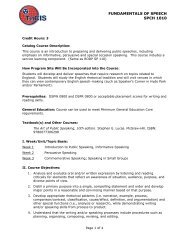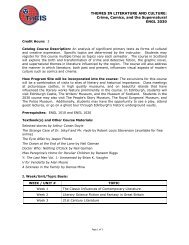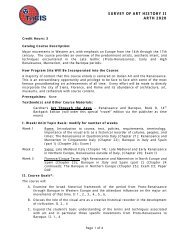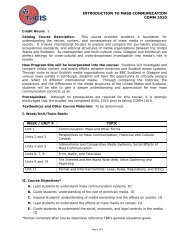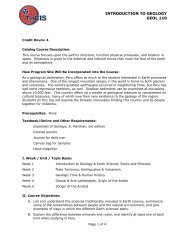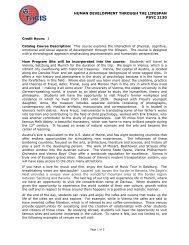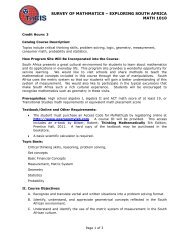INTRODUCTION TO HUMAN GEOGRAPHY GEOG 1030
INTRODUCTION TO HUMAN GEOGRAPHY GEOG 1030
INTRODUCTION TO HUMAN GEOGRAPHY GEOG 1030
Create successful ePaper yourself
Turn your PDF publications into a flip-book with our unique Google optimized e-Paper software.
with neighboring ethnic peoples and related problems, etc.). Outcomes are summarized asfollows:1. Analyze geographical facts and interpretations.2. Analyze and compare from a geographical perspective the political, economic, social,cultural, religious, and intellectual institutions, structures, and processes across arange of historical periods and environmental regions.3. Recognize and articulate the diversity of human experience across a range ofgeographical regions and the complexities of a global culture and society.4. Draw on geographical and historical perspectives to evaluate contemporaryproblems/issues.5. Analyze the contributions of past cultures/societies to the contemporary world.As a result of successfully completing this course the student will be able to demonstrategeneral knowledge of the spatial organization of human activity and human relationships,both between groups and within their particular environments.III. Instructional Processes:Course readings and field trips will bring cultural geography to life for students. In-classdiscussions and periodic fieldwork (to be recorded in your daily journal entries) will be usedto track progress.IV. Expectations for Student Performance:Upon successful completion of this course, the student should be able to:1. Understand the basics of geography, specifically cultural geography.2. Comprehend the unique cultural setting of India, as well as the greater pattern ofculture(s) around the globe.3. Understand the dynamics of global population growth and decline, specifically theexcessively high population growth rate and the prevalence HIV/AIDS.4. Illustrate the role environment plays in developing culture, as well as the humanimpact on nature.5. Understand the collision of cultures across the globe, and more specifically in India(e.g. Hindu vs. Muslins vs. Sikh, class warfare, untouchables, gender inequity, etc.).6. Understand the levels of economic development and the interaction of economiesacross the globe.7. Understand the culture of agriculture and the role the environment plays in thisprocess.8. Understand the politics of space (as India is the largest democracy in the world).9. Comprehend the role and function of global cities, especially New Delhi, Agra andJaipurV. Evaluation:A. Class Participation - Students are responsible for their own learning (meaning thatthis class will be “student based” learning instead of “instructor driven” learning).Participation, discussion and interaction are necessary components of this course.[10 points per day totaling 150 points]Page 4 of 5
B. Journal Notes - Students will make daily accounts of their readings and experiencesin their course journal. This will be no mere diary of activities, but an in-depthrendering of all things important to geography (e.g. regions, characteristics,relationships, patterns, processes, interactions, etc.). Elaboration noted below. [150points]C. Maps - There will be introductory map assignments associated with this course. Youwill be given hard copies of these maps or lessons at the spring 2011 orientation tocomplete before the trip to India. One will included blank outline maps of politicaland physical features of India. [50 points]D. Graphing Data Sets - You will be given population statistics for India, Germany andBurkina Faso to graph on x/y (age-sex) axes. [50 points]E. Final Exam - One semester exam is planned for the end of the course. This examwill be in a short response format and cover relevant topic (or topics) from the threeweekcoursework. [100 points]Total points possible = 500F. Grading Scale:VI. Policies:95 – 100 = A+90 – 94 = A85 – 89 = B+80 – 84 = B75 – 79 = C+70 – 74 = C65 – 69 = D+60 – 64 = D59 and below = FA. Attendance Policy:Attendance is of utmost importance in study abroad courses. There are no unexcusedabsences permitted. Multiple unexcused absences are grounds for removal from theprogram. Being in class on time is also very important. Frequent tardiness will beconsidered an absence and appropriate action will be taken. Absences due to illnessmust be reported immediately to the program director.B. Academic Dishonesty:Academic misconduct committed either directly or indirectly by an individual or group issubject to disciplinary action. Prohibited activities include but are not limited to thefollowing practices: Cheating, including but not limited to unauthorized assistance frommaterial, people, or devices when taking a test, quiz, or examination; writing papers orreports; solving problems; or completing academic assignments. In addition to otherpossible disciplinary sanctions that may be imposed as a result of academic misconduct,the instructor has the authority to assign either (1) an F or zero for the assignment or(2) an F for the course.VII. Instructional Hours:This class will consist of a minimum of 37.5 full hours of formal instruction.Page 5 of 5


